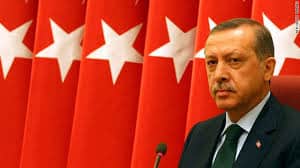We often hear U.S. and NATO spokesmen claim that they believe in a rules-based international order. They don’t.
The United States and its NATO allies have stressed repeatedly that Russia’s use of force to seize portions of Ukraine is reprehensible. They were emphatic on that point in 2014 when the Kremlin responded to the West’s role in overthrowing Ukraine’s democratically elected, pro-Russian president, Victor Yanukovych, by taking control of the Crimean Peninsula and then annexing it after a rigged referendum. The furious NATO powers imposed a variety of economic sanctions against Russia. Secretary of State John Kerry and other Western officials stated explicitly that such behavior was utterly unacceptable in a “rules-based” international system.
U.S. and European leaders took an even more hardline stance in February 2022 when Russia escalated the confrontation with Kyiv by launching a full-scale invasion and occupying major portions of Ukraine’s Donbass region. Washington and its allies promptly imposed a new array of even harsher economic sanctions on Russia. They also deepened their involvement in the dispute by providing weapons sales and other military aid to Kyiv, transforming the fight between Ukraine and Russia into a de facto NATO proxy war against Russia.
NATO’s hypocrisy on the issue of one country seizing another country’s territory by force is breathtaking. NATO as an entity committed the same offense when it bombed Serbia to compel Belgrade to relinquish control of its province of Kosovo in 1999. Moreover, a NATO member, Turkey, has committed blatant acts of aggression against three neighbors, Cyprus, Iraq, and Syria, to secure illicit territorial gains. NATO as an alliance, and the United States as NATO’s leading power, have tolerated Ankara’s rogue behavior, even as they express utter indignation at Moscow’s similar conduct.
Turkish troops moved into Cyprus in the summer of 1974, ostensibly to protect Turkish Cypriots, who made up a little less than 20 percent of the island’s population and were repeatedly involved in violent confrontations with the larger Greek Cypriot community. On this occasion, after the initial intervention, Turkish forces expanded outward from the predominantly Turkish areas in the north and promptly occupied ethnic Greek portions of the island, creating thousands of refugees.
Turkey’s aggression against Cyprus was more brazen and extensive than Russia’s absorption of Crimea or even the takeover of oblasts in the Donbass following the Kremlin’s larger 2022 incursion. Moscow now controls approximately 20 percent of Ukraine. By the time Turkish forces in Cyprus finished their offensive, they occupied nearly 40 percent of the country.
Washington’s reaction to Ankara’s aggression was tepid at best. Indeed, critics contend that Secretary of State Henry Kissinger was quietly supportive of Turkey’s actions. Members of Washington’s military elite definitely did not wish to antagonize their Turkish counterparts. Widespread anger in Congress about a NATO member committing such a blatant act of aggression led to the imposition of some sanctions against Turkey, but Ankara’s supporters in the executive branch and the defense industry worked to dilute those sanctions from the outset. Within a few years, the punitive measures faded away, and military cooperation between Washington and Ankara returned to normal. Congress lifted the embargo on sales of arms to Turkey in 1978.
U.S. policymakers soon were content to see the Cyprus situation become a frozen conflict. Year after year, Washington’s supposed mediation efforts to produce political reunification of Cyprus led to little progress. More than a half century after Turkey’s invasion and occupation of its neighbor, Ankara effectively controls northern Cyprus through a puppet client state that it created. Over 100,000 settlers from mainland Turkey were brought in, from 1974 to 2005, to replace Greek Cypriot residents who were expelled during the 1974 war.
Cyprus has been the most prominent victim of Ankara’s use of military force to gain control of additional territory, but it is not the only one. After the 2003 overthrow of Saddam Hussein’s Iraqi regime and the establishment of the self-governing Kurdish region in northern Iraq, Turkish military forces conducted dozens of incursions. During Donald Trump’s first administration, Ankara took even more extensive action against Kurdish-controlled regions in northern Syria. Turkey’s government has not made a formal claim to land in either country, but Ankara effectively controls a significant swath of territory beyond its border with both neighbors.
Washington’s alleged commitment to a rules-based international order is phony. That is especially the case with respect to the use of force for territorial conquest. U.S. leaders stood by with scarcely a murmur of protest as Israel seized and ultimately annexed Syria’s Golan Heights following the 1967 war. Nor did U.S. policymakers say much when Israeli governments moved settlers into the West Bank, forcibly displacing Palestinian residents. More recently, Washington has actively collaborated with Israel’s efforts to dominate Gaza and expel its Palestinian inhabitants.
Such Israeli actions are at least finally getting extensive attention and growing condemnation around the world. The territorial depredations of another rogue U.S. ally, Turkey, have gone largely unnoticed for decades. That attitude needs to change. U.S. leaders should hold a fellow NATO member to an even higher standard than they do other countries with respect to military aggression and the illicit seizure of territory. The contrast between Washington’s vehement condemnation of Russia’s actions in Ukraine and its tolerance of Turkey’s even more egregious actions in Syria, Iraq, and especially Cyprus is both striking and sickening.
Reprinted with permission from Antiwar.com.

